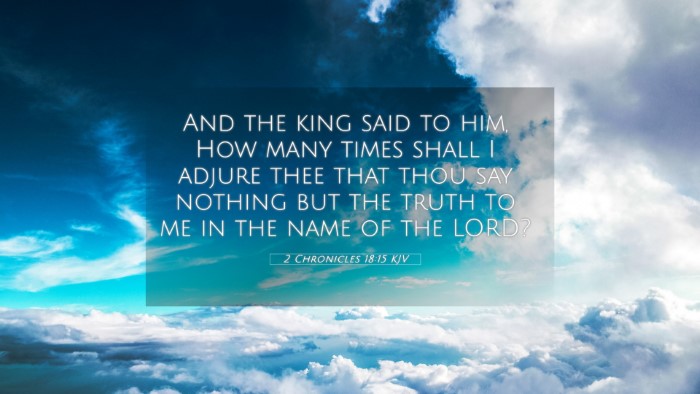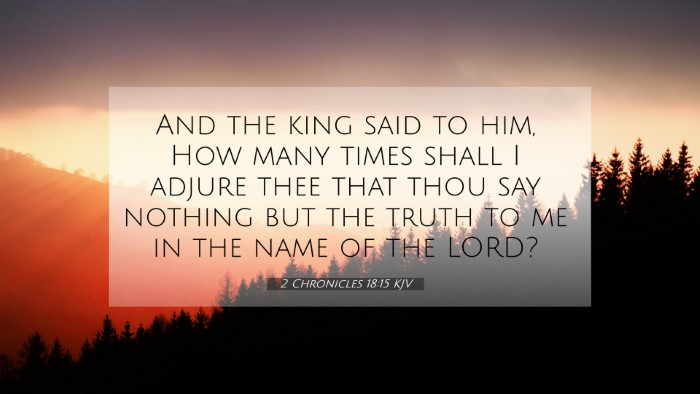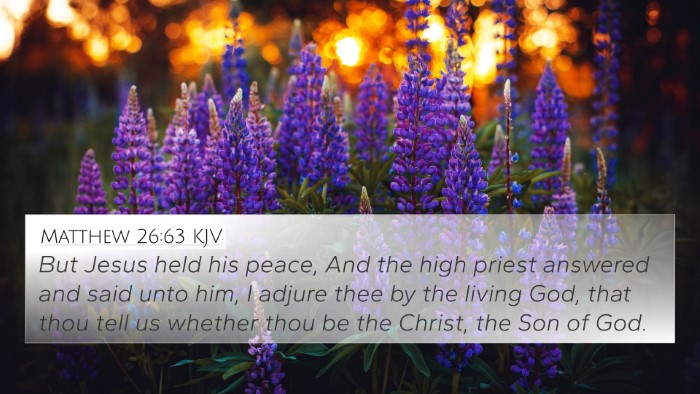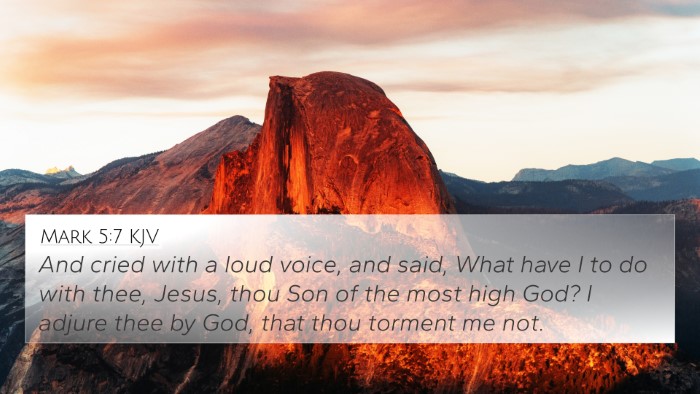Understanding 2 Chronicles 18:15
2 Chronicles 18:15 states, "And the king said to him, 'How many times shall I make you swear that you speak to me nothing but the truth in the name of the Lord?'" This pivotal moment in the narrative highlights the tension between sincerity in prophecy and the expectations of the king.
Summary and Insights
This verse occurs in a context where King Jehoshaphat and King Ahab are seeking counsel before going to battle. The request for truth emphasizes the importance of integrity and clarity in prophetic communication, which is continually addressed in biblical texts.
- Context: This moment occurs during a time of political alliance between Jehoshaphat of Judah and Ahab of Israel, reflecting on the complexities of shared governance and spiritual fidelity.
- Prophetic Integrity: Ahab’s request introduces a prophetic challenge where the truth is essential for guiding the king's decisions, drawing connections to the role of prophets throughout scripture.
- Tension in Disclosure: Jehoshaphat’s insistence on truth sets a stage for the unfolding of Micaiah's prophecy, contrasting falsehoods with divine revelation.
Commentary Insights
Matthew Henry notes the importance of seeking God's will in decisions, emphasizing that the king's insistence on truth serves as a crucial reminder for contemporary believers to yearn for divine guidance over political or personal bias.
Albert Barnes reflects on Jehoshaphat's character, showcasing his desire for truthful guidance amidst superficial counsel. This underlines the theme of spiritual discernment throughout the Bible, particularly in leadership roles.
Adam Clarke highlights the irony present in Ahab’s fear of honesty, portraying the conflict between heaven-sent truth and human deception. Clark’s commentary brings attention to the broader implications of prophetic voices in governance.
Related Bible Verses
In pursuing a comprehensive understanding of this verse, we can explore several Bible verse cross-references:
- 1 Kings 22:14 - Micaiah speaks only what the Lord tells him, showcasing the essential integrity of true prophetic voices.
- 2 Chronicles 18:28 - The aftermath of following false advice demonstrates the dangers of ignoring divine counsel.
- 1 Thessalonians 5:20-21 - Paul’s exhortation to test prophecies aligns with Jehoshaphat’s understanding of genuine truth-seeking.
- Proverbs 12:19 - "Truthful lips endure forever," highlighting the value of honesty in all communications, prophetic or personal.
- Jeremiah 14:14 - The contrast between the true and false prophets underscores the need for discernment, closely tied to Jehoshaphat’s plea.
- Ezekiel 13:9 - Reflects God’s judgment against false prophets, emphasizing the weight of truth in prophetic ministry.
- James 3:17 - Highlights the characteristics of godly wisdom, which includes truthfulness—an indirect reflection of Jehoshaphat's pursuit.
Cross-Referencing Techniques
By utilizing tools for Bible cross-referencing, believers can identify connections between Bible verses effectively:
- Utilize a Bible concordance to identify key terms and themes across scriptures.
- A Bible cross-reference guide can help you see thematic Bible verse connections.
- Study comparative Bible verse analysis by examining narratives or exhortations within both Old and New Testaments.
- Integrate cross-referencing Bible study methods into your personal devotions or group studies.
Conclusion
Ultimately, 2 Chronicles 18:15 serves not just as a historical observation but as an enduring lesson on the nature of prophetic integrity and the pursuit of divine truth in decision-making. Understanding connections and applying Bible verses that relate to each other enriches the reader's faith and comprehension of God's will.







